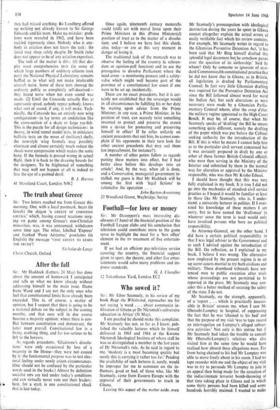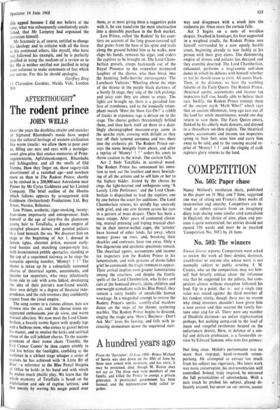Who sowed it?
Sir : Mr Tibor Szamuely, in his review of my book Reap the Whirlwind, reproaches me for not saying 'a word . . . about communist in- filtration of Ghana or Dr Nkrumah's subversive education in Africa' (31 May).
I am puzzled he should make this complaint. Mr Szamuely has not, so far as I know, pub- lished the valuable lectures which he himself delivered in 1963 and 1964 at the Kwame Nkrumah Ideological Institute of whose staff he was so distinguished a member in the last years of Dr Nkrumah's rule. As he said in regard to me, 'modesty is a most becoming quality but surely this is carrying it rather too far.' Pending the availabiliy of such lectures it, surely, would be improper for me to comment on the in- fluences, good or bad, of those who, like Mr Szamuely, came from Eastern Europe with the approval of their governments to teach in Ghana.
Leaving this aspect of the matter aside, even Mr Szamuely's preoccupation with ideological instruction during the years he spent in Ghana cannot altogether explain the actual errors of easily verifiable fact which his review contains. For example, Mr Szamuely writes in regard to the Ghanaian Preventive Detention Act, 'it has been said that Mr Bing himself drafted this splendid legal document but he somehow passes over the question of its authorship.' Said by whom? Only by someone so ignorant of stan- dard Commonwealth constitutional practice that he did not know that in Ghana, as in Britain, all legislation is drafted by Parliamentary Counsel. In fact very little Ghanaian drafting was required for the Preventive Detention Act since the Bill followed almost word for word the Indian Act, but such alterations as were necessary were made by a Ghanaian Parlia- mentary Counsel whom, after the coup d'etat, the military regime appointed to the High Court Bench. It may be, of course, that when Mr Szamuely speaks of 'drafting' the Bill he means something quite different, namely the drafting of the paper which was put before the Cabinet seeking authority for the introduction of the Bill. If this is what he means I cannot help him as to the particular civil servant concerned but it was certainly prepared in draft by one or other of those former British. Colonial officials who were then serving in the Ministry of the• Interior and submitted by them in the normal way for alteration or approval by the Minister responsible, who was then Mr Krobo Edusei.
I should have thought that this was very fully explained in my book. It is true I did not, go into the mechanics of standard civil service practice as I hoped it would be familiar at least to those like Mr Szamuely, who is, I under- stand, a university lecturer in politics. If I over- rated his knowledge of these matters I am sorry, but to have named the 'draftsman' in whatever sense the term is used would only have involved persons who bore no political responsibility.
As Attorney-General, on the other hand, I did have a certain political responsibility in' that I was legal adviser to the Government and as such I advised against the introduction of the Bill. On reflection, as I explained in my book, I believe I was wrong. The alternative now employed by the present regime is to set up secret courts martial to try both civilians and military. These drumhead tribunals have sen- tenced men to public execution after trials whose proceedings are not permitted to be reported in the press. Mr Szamuely may con- sider this a better method of securing the safety of the state. I do not.
Mr Szamuely, on the strength, apparently, of a 'report . . . which is practically inacces- sible in Britain' accuses me, when I saw Mr Obetsebi-Lamptey in hospital, of suppressing the fact that he was 'chained to his bed' and that the purpose of my visit 'was to tape record an interrogation on Lamptey's alleged subver- sive activities.' Not only is this untrue but if Mr Szamuely had taken the trouble to consult Mr Obetsebi-Lamptey's relatives who also visited him at the same time he would have realised how absurd these allegations were. Far from being chained to his bed Mr Lamptey was able to move freely about in his room. I had no tape recorder with me and the object of my visit was to try to persuade Mr Lamptey to join in an appeal then being made for the cessation of the indiscriminate terrorist bomb-throwing at that time taking place in Ghana and in which some thirty persons had been killed and some hundreds horribly maimed. I wanted to make
this appeal because I did not believe at the time, what was subsequently conclusively estab- lished, that Mr Lamptey had organised the terrorism himself.
Mr Szamuely is, of course, entitled to change his ideology and to criticise with all the force at his command others, like myself, who have not followed his example, and he is perfectly justified in using the medium of a review so to do. He is neither entitled nor justified in using your columns to make statements of fact which are untrue. For this he should apologise. Geoffrey Bing 11 Clarendon Gardens, Maida Vale, London W9











































 Previous page
Previous page